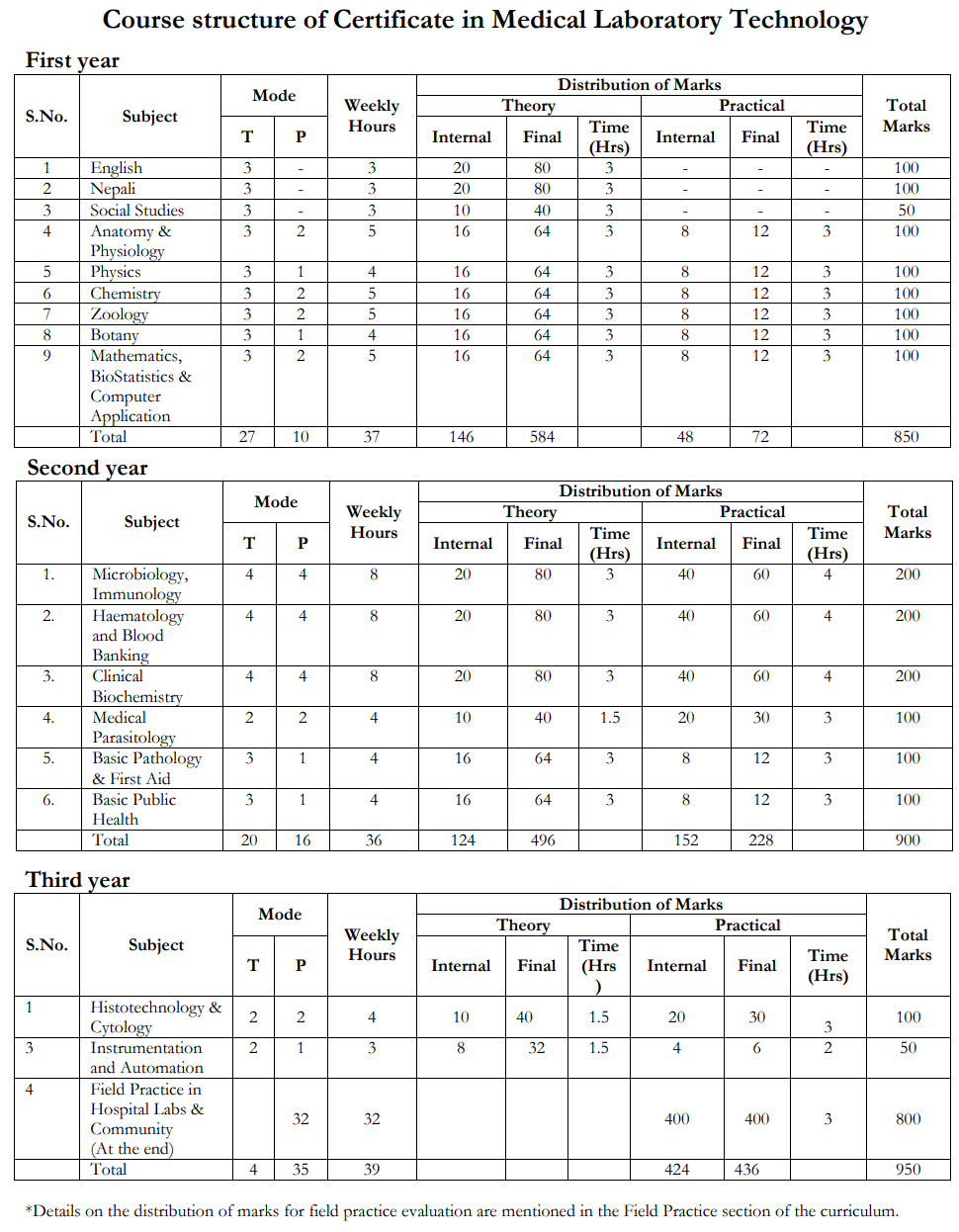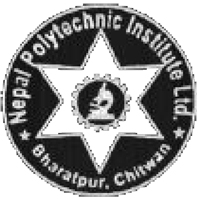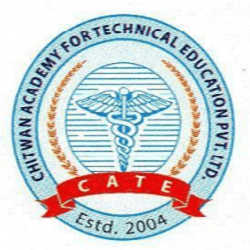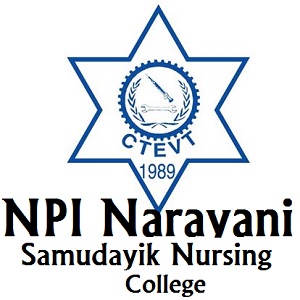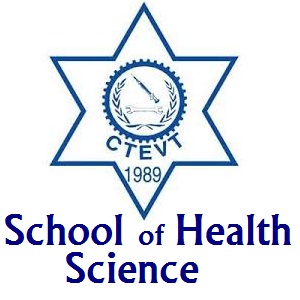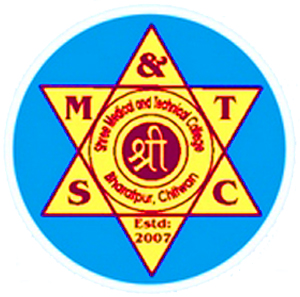Overview
Chitwan Medical College (CMC), Bharatpur, Chitwan, Offered a CMLT
Chitwan Medical College (CMC), Chitwan, offers a Certificate in Medical Laboratory Technology (CMLT), which is a three-year vocational program affiliated with the Council for Technical Education and Vocational Training (CTEVT). This program aims to produce skilled professionals capable of performing diagnostic laboratory tests critical for medical care.
Graduates are eligible to work in laboratories across Nepal and internationally after passing the licensing exam conducted by the Nepal Health Professionals Council. This program emphasizes theoretical knowledge and practical application, preparing students for real-world challenges in medical laboratory settings.
Program Duration
-
Duration: Three academic years
-
Structure:
-
Year 1: Focus on foundational subjects and basic sciences.
-
Year 2: Basic laboratory subjects with simultaneous theory and practical sessions.
-
Year 3: Comprehensive application of skills through practical settings in hospitals and laboratories.
Eligibility Criteria
-
Secured at least grade C in Compulsory Mathematics, Compulsory English, and Compulsory Science in the School Leaving Certificate (SLC / SEE) examination with an average GPA of 2 or higher.
-
For Pre-Diploma graduates in Lab Technology, a first-division pass is required.
-
Must have passed the entrance examination administered by CTEVT.
Admission Process
-
Submit the following documents:
-
SLC pass certificate
-
Character certificate
-
Citizenship certificate
-
Physical fitness certificate
-
Pass the CTEVT entrance examination.
-
Admission is merit-based and follows the CTEVT policy for student quota.
Course Outline
The CMLT curriculum includes theoretical learning with practical exposure:
-
Year 1: Basic sciences such as Anatomy, Physiology, Biochemistry, and Microbiology.
-
Year 2: Laboratory techniques covering Hematology, Histopathology, and Cytology.
-
Year 3: Advanced laboratory applications in clinical settings.
Subjects Offered
-
Anatomy
-
Physiology
-
Biochemistry
-
Microbiology
-
Hematology
-
Histopathology
-
Cytopathology
-
Serology
-
Medical Ethics
-
Laboratory Management
Program Objectives
-
To empower students with the skills to perform routine and special laboratory investigations.
-
Develop competencies in interpreting test results and maintaining quality control.
-
Enable students to set up clinical laboratories in primary health centers and district-level facilities.
-
Prepare students for middle-level laboratory management roles.
Teaching Methodology
The teaching methodology combines classroom instruction, hands-on laboratory work, and field training. Students engage in lectures, interactive discussions, demonstrations, and supervised practical sessions. Additionally, clinical exposure in hospital laboratories helps reinforce theoretical concepts.
Learning Outcomes
Graduates of this program will be able to:
-
Perform laboratory investigations independently.
-
Prepare and standardize laboratory reagents.
-
Maintain quality control in diagnostic procedures.
-
Establish and manage clinical laboratories.
-
Assisted in research activities and interpreted laboratory findings.
Future Scope
Graduates can pursue:
-
Advanced education, such as a Bachelor of Medical Laboratory Technology (BMLT).
-
Employment in public and private healthcare sectors.
-
Research opportunities in clinical and diagnostic laboratories.
-
Entrepreneurship by establishing diagnostic centers.
Career Prospects
-
Positions as Medical Laboratory Technicians in hospitals, clinics, and diagnostic centers.
-
Opportunities in research institutions and public health organizations.
-
Employment in pathology, microbiology, and biochemistry departments.
-
Roles in blood banks, histology, and cytology laboratories.
Scholarship Opportunities
CTEVT offers scholarships to deserving candidates, including those from marginalized communities. Merit-based scholarships are available for students with outstanding academic performance.
Fees Structure
CTEVT guidelines determine fees and include tuition, laboratory fees, and examination charges. Financial aid options are available.
Extracurricular and Co-Curricular Activities
Students participate in workshops, seminars, and health camps to enhance their practical knowledge and community engagement skills. Co-curricular activities include laboratory demonstrations, presentations, and collaborative projects.
Real-World Application
The program emphasizes real-world application through hospital-based training, where students gain hands-on experience handling clinical specimens and operating advanced laboratory equipment.
Sustainability and Social Impact
Graduates contribute to public health by ensuring accurate diagnostic testing and promoting disease prevention. Their work supports sustainable healthcare systems and improves community health outcomes.
Skill Development
The program hones analytical, technical, and managerial skills. Students develop expertise in laboratory techniques, problem-solving, and teamwork, preparing them for diverse healthcare roles.
Global Perspective
The curriculum aligns with international standards, enabling graduates to compete globally. The program fosters an understanding of global health challenges and solutions.
Facilities and Support
CMC provides state-of-the-art laboratory facilities, a well-stocked library, and experienced faculty. Students also benefit from career counseling and placement support.
Why Choose the CMLT Program?
This program stands out for its comprehensive curriculum, practical training, and focus on quality diagnostics. It prepares students for diverse roles in healthcare and ensures job readiness.
Is the CMLT Program Right for You?
If you are interested in science and aspire to contribute to healthcare through diagnostics, this program offers the perfect blend of theoretical knowledge and practical skills.
What is the Future of the CMLT Program?
With medical technology emerging, the demand for skilled laboratory technicians is rising. Graduates will have opportunities in emerging fields such as molecular diagnostics and personalized medicine.
How to Improve Your Study of Medical Technology Education
To excel in this field, focus on consistent study habits, hands-on practice, and participation in workshops and seminars. Stay regularly updated on advancements in medical technology and seek guidance from mentors.
Conclusion
The Certificate in Medical Laboratory Technology (CMLT) program at CMC provides a solid foundation for a career in healthcare diagnostics. Its integration of academic rigor and practical training ensures that graduates are well-equipped to meet the demands of the healthcare sector. Whether you aim to advance your education or start a rewarding career, this program is a gateway to numerous opportunities.
